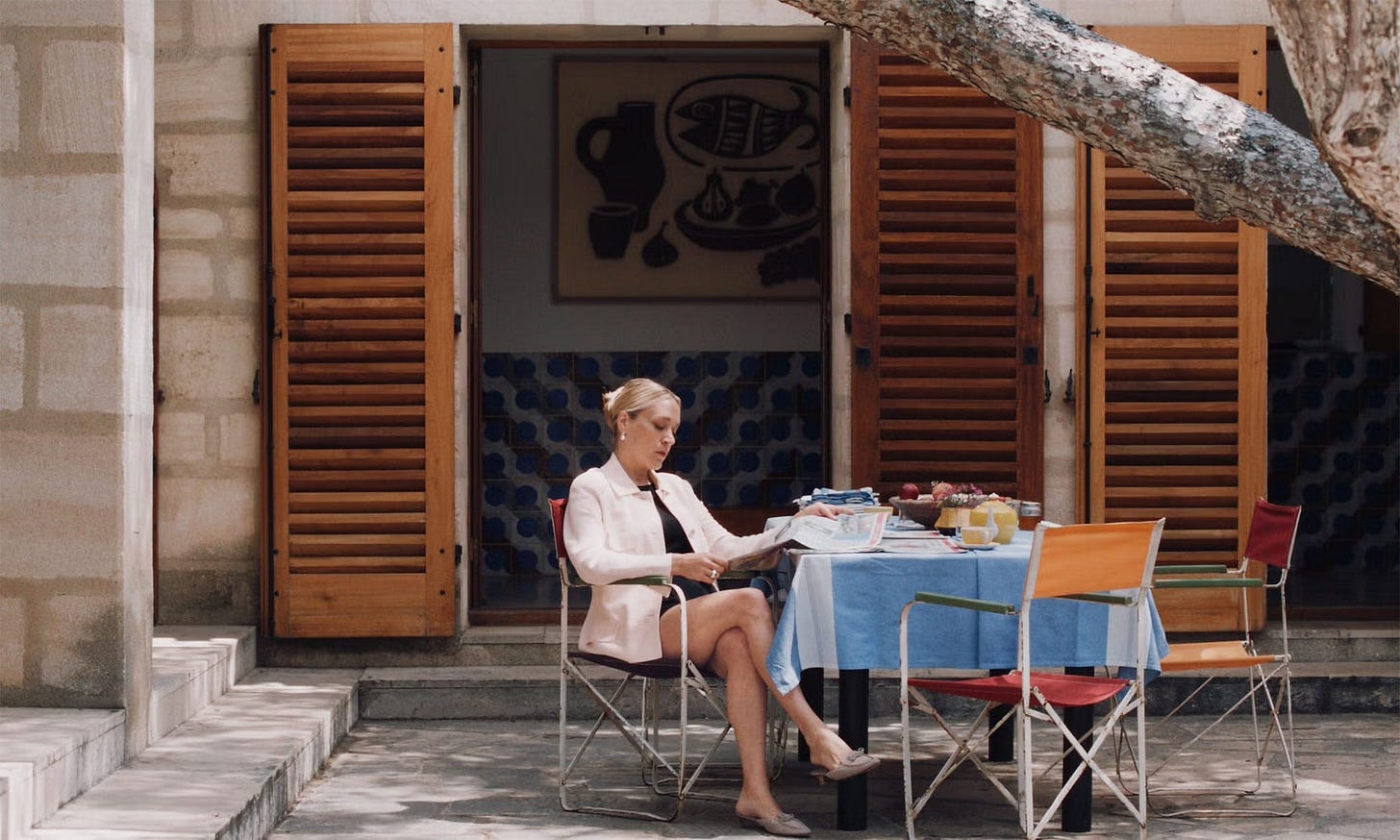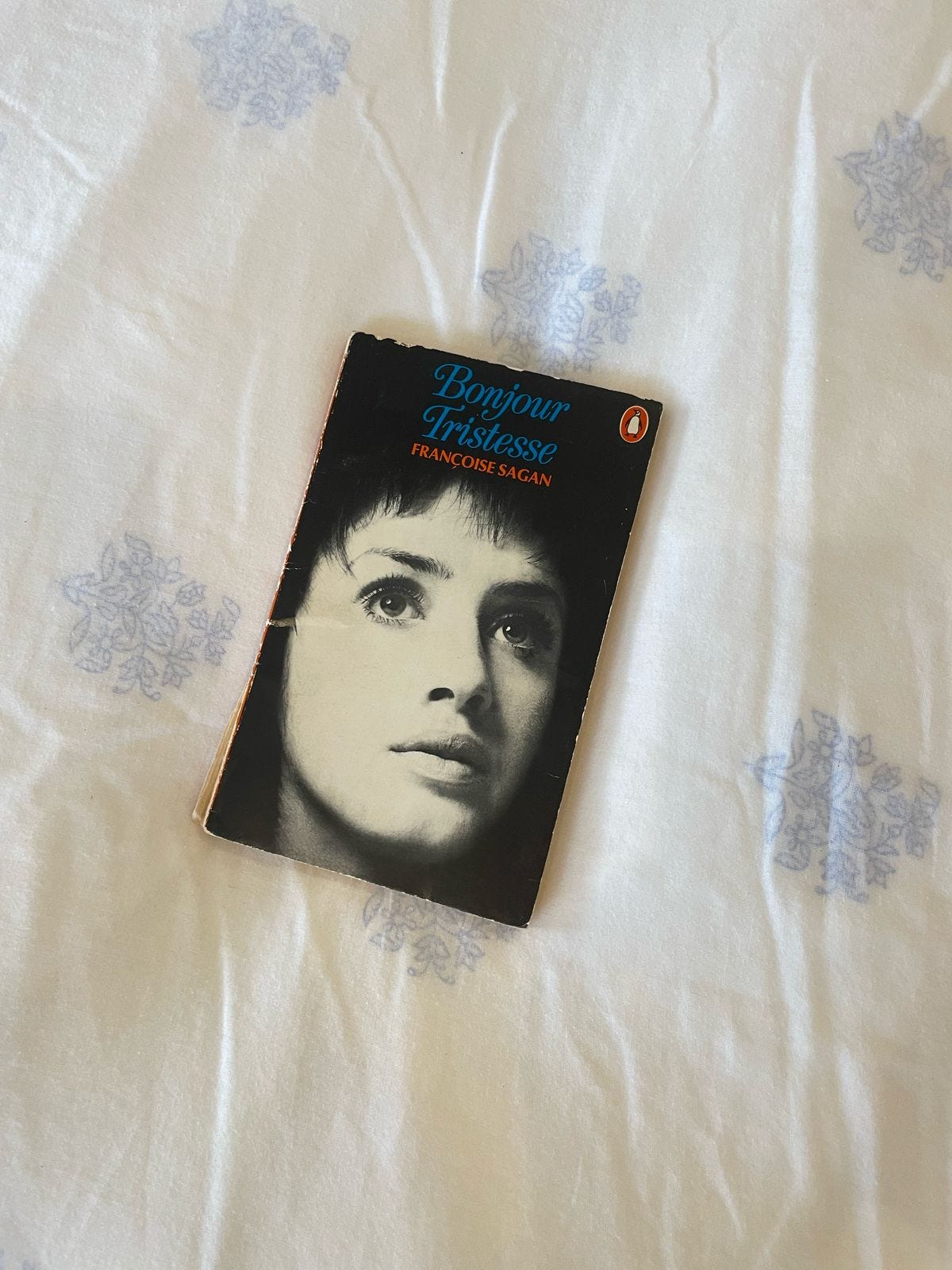Autumn musings
On reading habits, Bonjour Tristesse and some books I've thrifted recently
What to read?
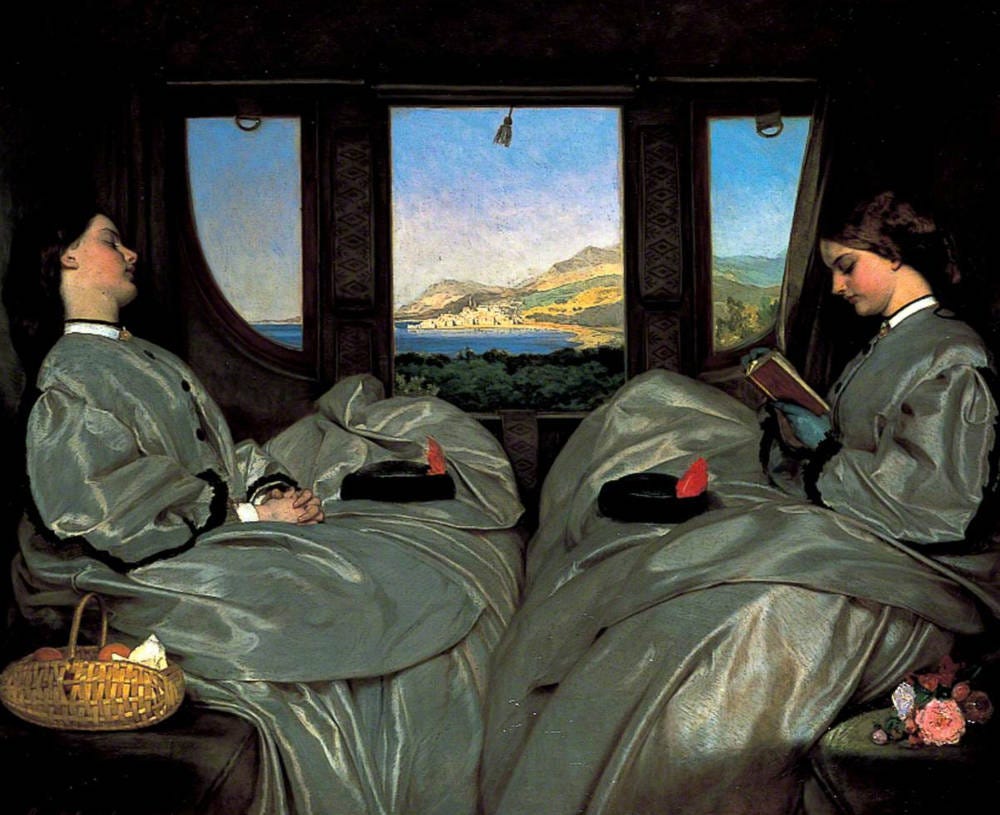
I love this painting of two women sitting on a train by Augustus Leopold Egg. Travelling Companions (1862). One of the women is reading, the other is dozing, her hands clasped together on her lap. Something about the scene brings me a sense of comfort and surrender. This is an image of absorption, but it’s still companionable and relational. The environment of the train compartment affords immersion. A view out the window. A temporary bracket of time and space.
I’m happiest, in the most expansive sense, when I’m utterly involved in what I’m reading, a state that’s rarer than I’d like it to be. I recently read “The Problem of Reading” in Moyra Davey’s Index Cards. Quoting the Canadian writer, Alison Strayer, Davey suggests that the problem of what to read speaks to a larger problem “of restlessness, unfocus.” Too often, like the woman in Davey’s essay, I’m pacing, anxiously handling various books, as if searching for a sign, “It is not just a question of which book will absorb her, for there are plenty that will do that, but rather, which book, in a nearly cosmic sense, will choose her, redeem her.” I love this emphasis on redemption because it speaks to how the right title can redeem not just one’s attention but sense of purpose, mood, vitality.
In my efforts to commit to a particular book, I often think about the relationship between reading and the weather, for instance. Or reading and place. Whether my habits are moving with the seasons and my whereabouts or against them. Oftentimes, my habits are out of sync with where I am and reflect a longing for elsewhere.
Recently, I’m longing for that feeling of moving into summer in the northern hemisphere. Dusting off the winter dark. The magnolia blossoms set against blue sky. The parks abundant with cow parsley. It’s possible I’m absorbed in elsewhere because it’s been unseasonably warm here in Cape Town. Signs that we’ve moved into autumn are subtle, though not absent. Seasonal change come quietly in the south. A blue hue to the slanting light. A nip in the air. Needing more than one blanket at night. I miss clear distinctions. And so here I am, longing for a previous life, during which I longed for the perpetual sun of the south.
Françoise Sagan’s Bonjour Tristesse
I picked up Bonjour Tristesse (1954) in the L'Elephant Terrible Bookshop at 44 Stanley in Joburg last year and tried to read it for the first time last December. Then it was summer and I was on holiday by the sea. The air was warm and close, the atmosphere a little claustrophobic since we were remote — the closest town was about an hour’s drive away. It seemed like the perfect book for where I was. But alas, it wasn’t the moment for the book. It simply didn’t hold my attention. Rather, it was Lauren Elkin’s psychoanalytic novel, Scaffolding (2024) that gripped me. Now, as I long for the warming air, the scent of pine needles, the cicadas rubbing their wings, it’s the right time.
Only after I picked up the novella for the second time, did I learn that it’s recently been adapted into a sumptuous film by Durga Chew-Bose starring Lily McInerny and Chloë Sevigny. This recent film isn’t the first adaptation. Otto Preminger directed the 1958 film, featuring Jean Seberg as the protagonist Cécile.
Learning of the new film, my discovery of the book last year took on a quality of serendipity, perhaps explaining my eagerness to pick it up again. This time, the book chose me. I read it in one sitting in the still warm autumn light, entirely lost in its world and grateful for a reprieve from my chronic inattentiveness and scattered mind.
Cécile is a precocious teenage girl on holiday in the French Riviera with her father, Raymond and his much younger girlfriend, Elsa. Cécile and her father have a close, verging on oedipal relationship. Raymond’s life is hedonistic, excessive. Cécile lives in a fantasy world borne of her father’s adherence to Oscar Wilde’s sentiment, “Sin is the only note of vivid colour that persists in the modern world.”
Cécile doesn’t quite realise it yet, but she’s searching for a code by which to live, a moral framework that will offer her distinction from her father, which is part of the appeal of Anne. Anne arrives early on in the novella, disrupting the world of father and daughter. Anne possesses an elegance and restraint that Cécile yearns for and recognises as profound but resents, as it will spell the end of her embroiled relationship with her father.
When Cécile learns of the Anne and Raymond’s engagement, she becomes petulant and her reverence for Anne turns to hatred. She spends the rest of the holiday plotting and devising schemes to break up the couple, who she can see are very much in love and whose love even touches and moves her. I won’t divulge anymore of what follows but I couldn’t help thinking of a more brutal and French Briony Tallis in Atonement.
Cécile doesn’t realise that her actions can and will have effect in the world. The older Cécile and narrator of the story is still reckoning with these effects. On the very first page she writes, “In the past the idea of sadness always appealed to me, now I am almost ashamed of its complete egoism.” True sadness, the older Cécile has learned, is not beautiful but isolating.
Books I’ve thrifted recently
I’m in the process of compiling books for the next phase of Edna’s, thinking about how these titles might come together in the future, in the form of a small store or library of sorts. Over the easter weekend, I was in Hermanus. It was a beautiful, blue day. I found a bunch of titles which I plan to feature at the end of each newsletter.
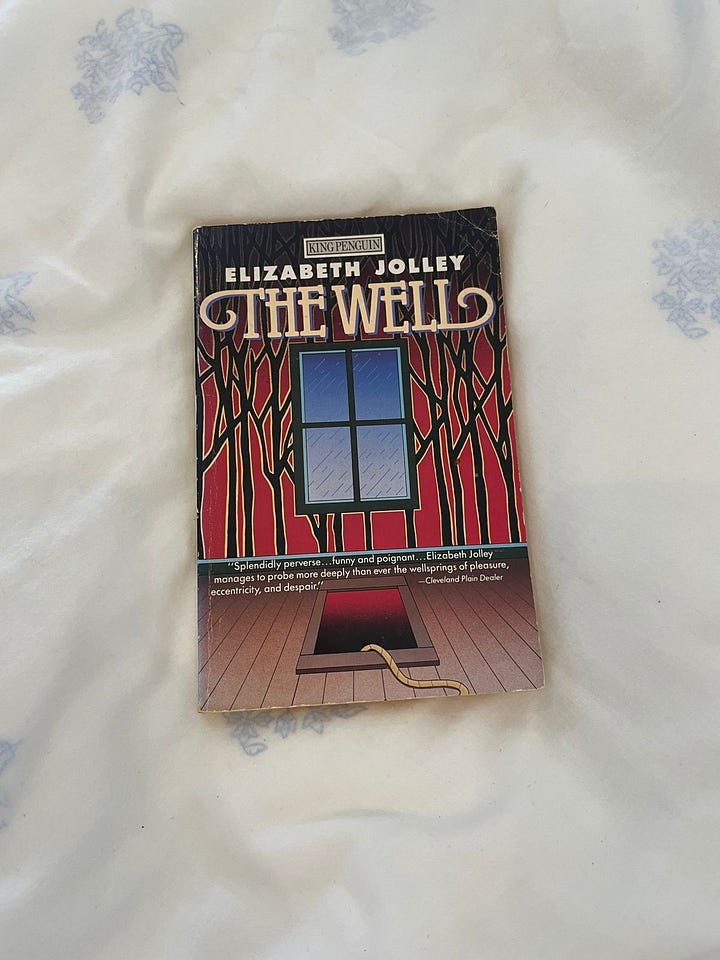
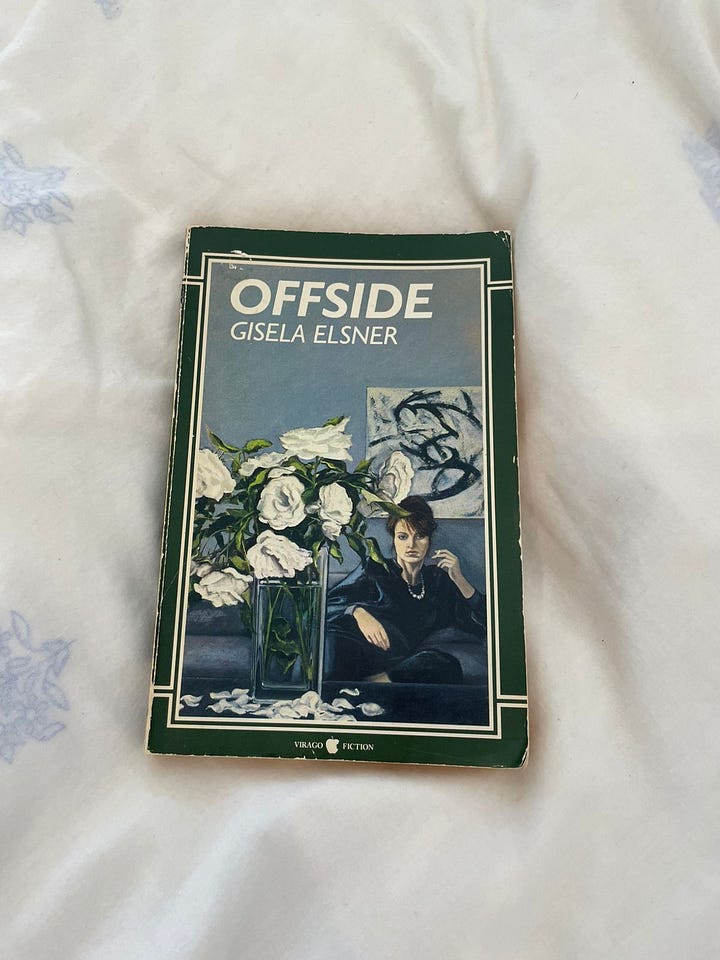
I’m curious about The Well by Elizabeth Jolley and Offside by Gisela Elsner, both published in the 1980s. I’m intrigued by their centring of queer and female desire, and it’s unruly or uncanny qualities — a theme I’m more generally interested in building a library around.
The Well is a work of Australian gothic (one of my favourite genres) and is described as a “haunting tale of obsessive love and sexual awakening.” It centres a companionship between two women, Hester and Katherine who live “against the stark and unyielding beautiful of the Australian Farmlands.” The idyllic bliss the two share, “a life replete with the satisfaction of daily chores well done and small pleasures thoroughly enjoyed,” is disturbed one night when Katherine hits “a stranger” on the road.
Offside is a retelling of Madame Bovary and features anti-heroine, Lily Besslein. Married and despondent, Lily hopes that parenthood will bring her the sense of purpose she craves. When the promises of motherhood elude her, “she takes a job, a baby-minder, a lover - and larger and larger doses of tranquillisers; she drinks martinis and spends extravagantly on clothes.”
I write this as a fine mist of cloud wafts in from the ocean and as I search for the next title to absorb me. I’m excited to have a new story out with The GOAT PoL and a review forthcoming in Full Stop. As always, thank you for reading Edna’s.
x


